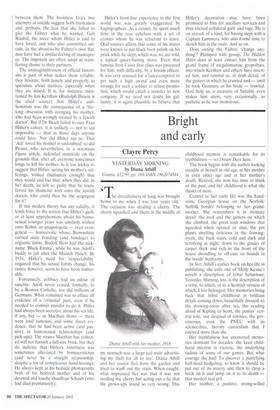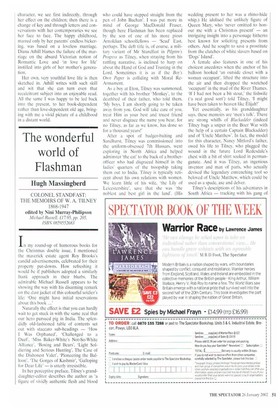Bright and early
Clayre Percy
YESTERDAY MORNING by Diana Athill
Granta, £12.99, pp. 169, ISBN 1862074844
The dreadfulness of lying was brought home to me when I was four years old.' The occasion was stealing a cherry. The cherry squashed and 'there in the middle of
my stomach was a large red stain advertising my theft for all to see'. Diana Athill and her cousin fled from the garden and tried to wash out the stain. When caught, what impressed her was that it was not stealing the cherry but acting out a lie that the grown-ups found so very wrong. This childhood memoir is remarkable for its truthfulness — no Dream Days here.
The book begins with the author looking steadily at herself in old age, at her mother in even older age and at her mother's death. Retired, she now has time to think of the past, and her childhood is what she thinks of most.
Central to her early life was the handsome Georgian house on the Norfolk/ Suffolk border belonging to her grandmother. She remembers it in intimate detail: the roof and the gutters on which she climbed, the great sash windows that squealed when opened or shut, the pot plants smelling delicious in the drawingroom, the back stairs, cold and dark and terrifying at night, down to the grades of carpet thick and rich in the front of the house dwindling to off-cuts on boards in the maids' bedrooms.
In Stet, Athill's earlier book on her life in publishing, she calls one of Molly Keane's novels a description of tribal behaviour; Yesterday Morning, too, is the description of a tribe, to which, or to a Scottish version of which, I too belonged. Her memories bring back that tribal childhood in brilliant detail: coming down, beautifully dressed, to the drawing-room after tea, the reading aloud of Kipling or Scott, the ponies' central role, our despisal of townies, the governesses, even the PNEU with its science-free, literary curriculum that I enjoyed more than she.
Her truthfulness has uncovered memories dormant for decades: the keen childhood interest in excreta, the underlying sadism of some of our games. But what courage she had! To discover a putrefying half-dead hedgehog, to know it should be put out of its misery and then to drop a brick on it and jump on it to its death — that needed real grit.
Her mother, a positive, strong-willed character, we see first indirectly, through her effect on the children; then there is a change of key and through letters and conversations with her contemporaries we see her face to face. The happy childhood, marred only by her parents' endless bickering. was based on a loveless marriage. Diana Athill blames the failure of the marriage on the absurd Victorian notion of Romantic Love and in love for life' instilled into girls of her mother's generation.
Her own. very youthful love life is then sketched in. Athill writes with such skill and wit that she can turn even that recalcitrant subject into an enjoyable read. All the same I was happy to be led back into the present, to her book-dependent rather than love-dependent old age, bring
ing me a vivid picture of a childhood in a distant world.



















































































 Previous page
Previous page